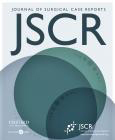
Leslie Capo
Office: 504-568-4806
Cell: 504-452-9166
lcapo@lsuhsc.edu
Related

Neglected skin cancer in the elderly: a case of basosquamous cell carcinoma of the right shoulder
According to the National Cancer Institute, basal cell carcinoma is the most common form of skin cancer, as well as one of the most neglected. The elderly are at high risk for advanced disease due to social isolation, skin changes and multiple illnesses.
The authors discussed the case of an 86-year-old female whose only complaint at presentation was progressive fatigue. The physical examination, however, revealed a large ulcerated basosquamous carcinoma. She admitted to hiding it for at least six months because of her husband’s poor health and not wanting to “bother” her family.
The authors noted that timing of diagnosis and extent of disease determine the standard of care for basal cell carcinoma, which could be non-surgical management with topical therapies. Advanced tumors, like the one in this case though, require complex surgery and reconstruction, often accompanied by radiation therapy.
“Recent research demonstrates the role of certain genes in the development of basal cell carcinoma,” said Frank Lau, MD, Assistant Professor of Clinical Surgery and Surgical Director of Regenerative Medicine at LSU Health New Orleans School of Medicine.
The authors noted the early success of vismodegib, a small molecule inhibitor and oral medication for metastatic basal cell carcinoma, local recurrence after an initial operation and patients who are not candidates for either surgery or radiation. Clinical trials showed response rates of 58%, 30% in metastatic disease and 43% in locally advanced disease with minimal adverse effects.
“These trials suggest that this drug may provide a viable option for the treatment of previously untreatable basal cell carcinoma without the risk of a potentially disfiguring surgery,” said Adam Riker, MD, FACS, Professor of Surgery and Chief of Surgical Oncology at LSU Health New Orleans School of Medicine.
The authors concluded that the combination of surgery and radiation therapy remains the mainstay of treatment and that a combination of radiation and vismodegib may be more effective for the treatment of advanced disease. Their case study points out the need to consider all treatment options, account for the overall health of the patient and discuss in detail the risks and benefits of each approach before deciding on a course of treatment.
The authors also included medical student Erika Bisgaard and resident Michael Tarakji, MD.
